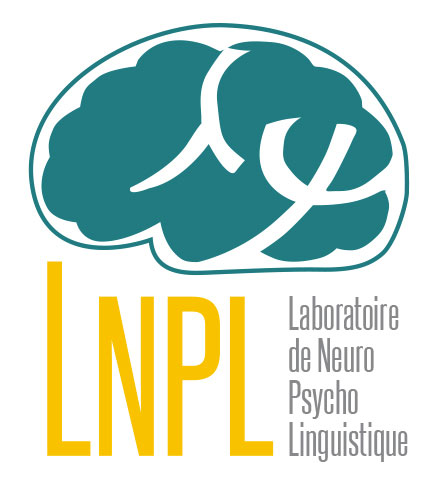-
Partager cette page
Soutenance de thèse : Emilie Massa "Bilinguisme, contrôle exécutif et vieillissement : données comportementales et électrophysiologiques"
Publié le 22 février 2017 – Mis à jour le 18 février 2022
le 10 mars 2017
9h
Maison de la recherche, salle D29Jury :
Radouane EL YAGOUBI (MCF, CLLE-LTC, Université de Toulouse 2) : co-directeur
Frédérique GAYRAUD (PR, DDL, Université Lyon 2) : rapporteur
Michel ISINGRINI (PR, CeRCA, Université François Rabelais de Tours) : rapporteur
Barbara KÖPKE (PR, Octogone-Lordat, Université de Toulouse 2) : co-directrice
Jean-Claude MARQUIE (DR, CLLE-LTC, Université Toulouse 2) : président du jury
Guillaume THIERRY (PR, BULET, Bangor University) : examinateur
Résumé :
Depuis une quinzaine d’années, un nombre important d’études observent de meilleures performances des locuteurs bilingues en comparaison avec leurs pairs monolingues dans des tâches évaluant le fonctionnement exécutif. L’hypothèse proposée pour expliquer ce phénomène repose sur l’idée que la gestion de plusieurs langues créerait un entrainement cognitif renforçant les capacités de contrôle exécutif de manière globale. Le passage d’une langue à l’autre demande au locuteur de la flexibilité cognitive ainsi que de l’inhibition de la langue non choisie dans le contexte de communication. Les conditions qui favorisent l’émergence de cet « avantage » bilingue ne sont cependant pas complètement claires. Cette question a d’autre part rarement été explorée chez des locuteurs bilingues âgés qui présentent pourtant un intérêt majeur dans la mesure où le vieillissement s’accompagne globalement d’un déclin des fonctions exécutives. L'objectif général de ce travail de recherche est d’apporter des éléments de compréhension à l’impact du bilinguisme sur le fonctionnement exécutif. De manière plus spécifique, nous cherchons à savoir a) si les locuteurs bilingues bénéficient d’un avantage exécutif lié à la pratique des langues, b) si cet avantage se maintient avec l’âge et c) comprendre sur quelle(s) fonction(s) exécutive(s) il porte. Pour cela nous comparons des locuteurs bilingues et monolingues jeunes et âgés dans un large éventail de tâches linguistiques et non linguistiques permettant d’évaluer le fonctionnement exécutif. Dans une switch task de dénomination d’images, des mesures électrophysiologiques (potentiels évoqués) ont été associées aux mesures comportementales afin d’obtenir un décours temporel plus précis des processus mis en jeu dans le changement de langue. De manière générale, les résultats montrent que les locuteurs bilingues sont avantagés lorsque les tâches sont de nature linguistique mais que cet avantage tend à disparaître dans des tâches non linguistiques. Ce résultat suggère que l’avantage lié à la pratique extensive des langues reste spécifique au domaine linguistique mais n’est pas généralisable au contrôle exécutif dans son ensemble.
Mots clés : Bilinguisme, Vieillissement cognitif, Contrôle des langues, Fonctions exécutives, Potentiels évoqués
Abstract:
The positive effects of bilingualism on executive control have recently received an increasing amount of attention. It has been hypothesized that bilinguals would benefit the constant manipulation of two languages. Indeed, language selection requires an important level of inhibition of the irrelevant language and flexibility during language switching. Thus these two mechanisms should enhance bilingual speakers’ ability to ignore irrelevant stimuli, not only in language tasks but also in domain-general executive control tasks. However, the circumstances that would foster this bilingual speakers’ advantage remain unclear. Furthermore, very little is known about the impact of bilingualism on elderly speakers whereas it could be a major opportunity to understand the impact of an extensive practice on executive control as executive functions have been shown to decline with aging. The general aim of this study is to examine the role of bilingualism on executive functions and its mediating role on age-related decline. To this end, we have compared young and elderly bilingual and monolingual speakers on linguistic and nonlinguistic executive functions tasks. Both behavioural and event-related potentials (ERPs) measures were collected during a picture naming task. Results show that bilingual speakers outperform monolinguals on linguistic tasks but not on nonlinguistic ones, suggesting a domain specific but not domain general advantage.
Keywords : Bilingualism; Cognitive Aging; Language control; Executive functions; ERPs
Mots clés : Bilinguisme, Vieillissement cognitif, Contrôle des langues, Fonctions exécutives, Potentiels évoqués
Abstract:
The positive effects of bilingualism on executive control have recently received an increasing amount of attention. It has been hypothesized that bilinguals would benefit the constant manipulation of two languages. Indeed, language selection requires an important level of inhibition of the irrelevant language and flexibility during language switching. Thus these two mechanisms should enhance bilingual speakers’ ability to ignore irrelevant stimuli, not only in language tasks but also in domain-general executive control tasks. However, the circumstances that would foster this bilingual speakers’ advantage remain unclear. Furthermore, very little is known about the impact of bilingualism on elderly speakers whereas it could be a major opportunity to understand the impact of an extensive practice on executive control as executive functions have been shown to decline with aging. The general aim of this study is to examine the role of bilingualism on executive functions and its mediating role on age-related decline. To this end, we have compared young and elderly bilingual and monolingual speakers on linguistic and nonlinguistic executive functions tasks. Both behavioural and event-related potentials (ERPs) measures were collected during a picture naming task. Results show that bilingual speakers outperform monolinguals on linguistic tasks but not on nonlinguistic ones, suggesting a domain specific but not domain general advantage.
Keywords : Bilingualism; Cognitive Aging; Language control; Executive functions; ERPs

